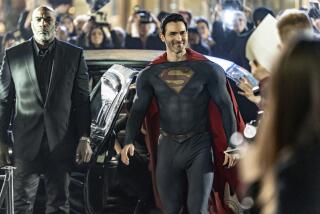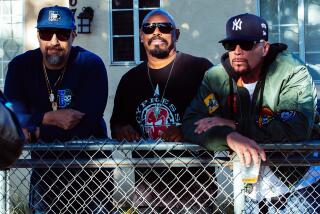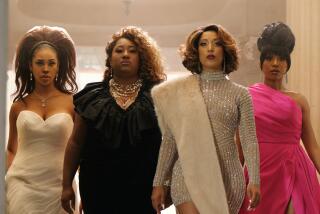When Fiction Gets Too Close for Comfort . . . : Television: ABC postpones second episode of a two-part drama on ‘Under Cover’ because of events in the Persian Gulf--over the producers’ objections.
- Share via
Two Saturdays ago, Sam Hamadi, an American intelligence operative, infiltrated a secret Iraqi military unit. Last Saturday, the agent--half Arab and half Jewish--discovered that the troop was planning on firing two Scud missiles armed with a deadly virus into Israel. And he had to keep talking on the radio in the hostile camp so Navy fighters, darting off a U.S. aircraft carrier in the Mediterranean, could pinpoint him and the firing batteries.
At least, that’s what was supposed to happen last Saturday. But ABC, over the producers’ objections, nervously postponed the second episode of the two-part drama on its new “Under Cover” series because of real events in the Persian Gulf. The network will anguish this week over whether to run the climactic program this Saturday.
“I don’t know when we’ll decide,” said Ted Harbert, the network’s executive vice president of prime-time programs. “We could decide Friday night. We could decide it any time. We should do it in time to let the audience know, but we’re just going to have to monitor the war closely.”
He went on. “The scenario is so realistic and so close to what’s going on there, that, well, I was talking to somebody and they thought frankly that this could scare the hell out of people--and that it probably is not our job right now to be adding to people’s fears.”
The decision to postpone the episode and replace it with an episode of “MacGyver” was made Friday after some lively debate involving Harbert and Robert Iger, president of ABC Entertainment, on the one side, and series executive producers Bill Broyles Jr. and John Sacret Young on the other. Broyles and Young have had occasional disagreements with ABC officials on their previous series, “China Beach,” which they created and ran.
Broyles, who created “Under Cover,” which premiered Jan. 7, was asked if harsh words were exchanged in several telephone conversations with network executives last week after the war began. He laughed and said, “There was full and frank discussion--as they say in diplomatic circles.”
Broyles didn’t want “to use the C word (for censorship),” he said. “They gave into pressure and fear.”
Harbert acknowledged “a really kind of spirited internal discussion.”
“I’ve been to war for this country (he served as a Marine in Vietnam in 1969-70),” Broyles said, “and I think what they’re fighting for now and what everybody thinks Americans should be fighting for is the right to see these things and make up their minds for themselves. I don’t think this is either fanning the flames of war or mocking those who have gone to war.”
The “Under Cover” episode in dispute is titled “Sacrifice” because in the unseen episode, agent Hamadi, played by a Latino actor, Jesse Borrego, faces certain death as he stays on the radio and, in effect, directs the U.S. attack onto himself.
“We (he and Young) tried to persuade them that this show was about the same heroism and courage that Americans were exhibiting right now and they should look at this as a chance to show what dramatic television can do and not be afraid of it,” Broyles said.
Broyles suggested that ABC sales executives might have directed the postponement. Harbert acknowledged that the ad department projected “a mass pullout” of sponsors if the episode aired, but said that ABC senior management in New York gave the final decision to Iger and the entertainment division.
Harbert said that ABC executives were “very much torn over this” and that one factor in the decision was the expectation of “heavy, heavy criticism” if it ran the episode.
The series, scheduled for a run of 13 episodes at 9 p.m. Saturdays, focuses on a married couple, Kate (played by Linda Purl) and Dylan (Anthony Denison), who are agents for the CIA-like National Intelligence Agency. It strives for stories about the emotional turmoil that a dangerous occupation creates for a family and tries for a sense of realism in its more adventurous intrigues in overseas locales. The story editor is Frank Snepp, a longtime CIA agent who also has done some investigative reporting for ABC News.
The “Sacrifice” story was written last summer by Thania St. John and was shot in September and October in a variety of local sites, including the Burbank Studio, a cemetery in Compton and a trash dump in Newhall.
In the story, Kate, back to duty after 10 years of raising her family, took rookie agents Sam and Alex (for Alexandra, played by Kasi Lemmons) into Kuwait on an easy mission--except that it turned out, as plot twists had it, to be right before the invasion by Iraq.
By the end of the first hour, Sam, who had been posing as an Iraqi who had been attending Yale, had stumbled onto and into a group of supposed Iraqi students. The NIA sensed a possible invasion afoot and sent Dylan and sidekick Flynn (John Rhys-Davies) into Baghdad. Meanwhile, back in Kuwait City, Kate and Alex were arrested by Iraqi invaders.
In the postponed episode, while Dylan and Flynn are raging toward Kuwait to save the others, an agent from the Mossad, the Israeli secret service, tells the NIA that it knows about Sam and of shenanigans by a renegade Iraqi colonel involving biological warheads. But it demands that the NIA pull Sam out of the action because the Mossad has its own man deep under cover with the “student” group.
But Sam hadn’t known that and, in his zeal, fingers the agent to the Iraqis. They execute the Israeli, and Sam has to stay in the radio trailer to await the Navy jets.
Broyles said that the plot drew on Snepp’s earlier reporting for ABC News on Iraq’s biological weapons capability.
He said that, in the debate with ABC, network executives expressed concern that if Israel really did come under attack by Iraqi germ weapons, broadcasting the episode “would be very confusing and insensitive.”
The producers proposed running announcements at the start and conclusion of the episode stressing that it was fiction.
“I’m not attacking these guys,” Broyles said. “I have sympathy for their decision. I just don’t agree with them.”
Harbert noted, “During a war, at the network we can over-analyze what our impact on the viewer is. Sometimes we do think too much about it. . . . So we went back and forth on that. But I think in this case we made the right decision. We would just rather err on the side of opprobrium.”
More to Read
The complete guide to home viewing
Get Screen Gab for everything about the TV shows and streaming movies everyone’s talking about.
You may occasionally receive promotional content from the Los Angeles Times.






